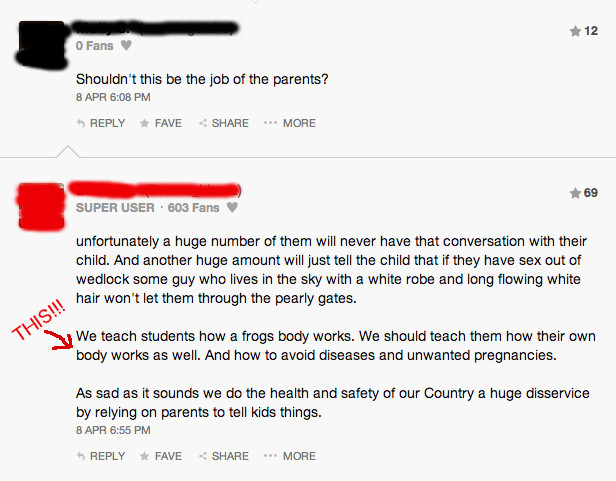Texas, my beloved home state, has some pretty wacky ideas about sex. Specifically, about how we should and should not talk about sex in front of the kids—and, to be clear, I used the word “should” there for demonstrative purposes only, because a huge part of the state seems to think that we should not talk to kids about sex, ever. Especially not in school.
Huffington Post created maps showing which states have less-than-progressive policies regarding sex education in five areas (h/t Lynn), and of course Texas appears in all five:
- No requirement for sex education;
- No requirement for HIV education;
- No requirement that the sex and HIV education that is provided is medically accurate;
- Requirement that any sex ed that is provided include abstinence information, with no requirement for contraception information; and
- Requirement that any sex ed that is provided, and that includes any information on same-sex relationships, only include negative information.
In that last category, we only find three states: Texas, Alabama, and South Carolina.
Yes, Texas has one of those “no promo homo” laws. Specifically, § 85.007(b) of the Texas Health & Safety Code, which deals with HIV education and prevention programs for minors, states that:
The materials in the education programs intended for persons younger than 18 years of age must:
(1) emphasize sexual abstinence before marriage and fidelity in marriage as the expected standard in terms of public health and the most effective ways to prevent HIV infection, sexually transmitted diseases, and unwanted pregnancies; and
(2) state that homosexual conduct is not an acceptable lifestyle and is a criminal offense under Section 21.06, Penal Code.
Texas Penal Code § 21.06, in case anyone forgot, makes it a Class C misdemeanor, punishable by a fine of up to $500, for a person to “engage[] in deviate sexual intercourse with another individual of the same sex.” You might also recall that the U.S. Supreme Court ruled § 21.06 unconstitutional more than ten years ago in Lawrence v. Texas. In effect, sex educators are required by law to give children false information.
But why, you might ask, are schools even involved in this issue? Shouldn’t this be up to parents? Well, in a world in which all parents are actively involved in their children’s lives, and where one child’s lack of sex education does not have any adverse impact on the lives of other people, I would agree with you. That world does not exist, though. We have to live in this one. A couple of comments on the HuffPo article summed it up quite well, especially this:
We teach students how a frogs body works. We should teach them how their own body works as well.
And this:



